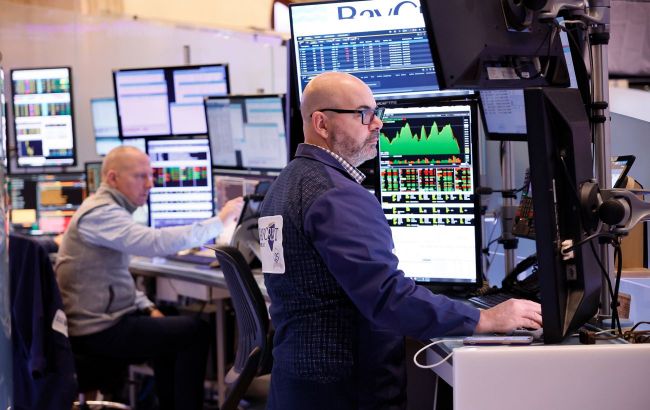US, Japan, and beyond: Global markets experience massive crash
 Photo: The world's stock exchanges are experiencing a huge collapse (Getty Images)
Photo: The world's stock exchanges are experiencing a huge collapse (Getty Images)
Global stock markets are falling due to fears of a recession in the United States. The markets of the Asia-Pacific region were particularly affected, with Japanese stocks experiencing the biggest drop in 40 years since Black Monday in 1987.
RBC-Ukraine has gathered all the information known so far.
Contents
- Bad news from US: how it all started
- Black Monday in Japan: biggest stock drop in almost 40 years
- Other stock markets
- How cryptocurrency, gold, and oil prices react
- Grandiose collapse reasons
Bad news from US: how it all started
On Friday, August 2, US stocks sold off for the second session in a row as the Nasdaq Composite Index fell after a jobs report that sparked fears of a recession in the United States.
According to the Labor Department, nonfarm payrolls increased by 114,000 in July, well below the median forecast of economists who had expected 175,000 to 200,000. The unemployment rate jumped to 4.3%, almost reaching a three-year high.
This report increased concerns that the US economy is slowing down faster than expected. And also that the Federal Reserve was wrong to keep rates at the same level. The weak data triggered the so-called Sahm's Rule, which is considered an accurate indicator of recession.
The Dow Jones fell by 1.51%, the S&P 500 by 1.84%, and the Nasdaq Composite by 2.43%. Additional pressure was exerted by Amazon's 8.79% drop and Intel's 26.06% drop after quarterly reports and unrealized forecasts.
As a result, at the close of trading, the Nasdaq Composite fell by more than 10%, the S&P 500 closed at its lowest level since June 4, the benchmark S&P index and the Dow blue chips suffered their biggest two-day drop since March 2023.
The VIX volatility index, also known as Wall Street's fear gauge, broke through its long-term average of 20 points, reaching 29.66, the highest level since March 2023, before closing at 23.39.
The number of stocks that fell in price outnumbered those that rose in price by a ratio of 2.92:1 on the NYSE and 4.52:1 on the Nasdaq. The S&P 500 recorded 62 new 52-week highs and 15 new lows, while the Nasdaq Composite recorded 34 new highs and 297 new lows.
Friday's trading volume on US stock exchanges amounted to 14.75 billion shares. Over the past 20 days, the average per session was $11.97 billion.
Today, futures are still lower, which suggests that the Nasdaq 100 is set for its biggest drop in four years. This is due to a decline in mega-capitalized companies. Nvidia shares fell by almost 10%, and other members of the trillionaire club - Apple, Amazon, Microsoft, Alphabet, Google, and Meta Platforms - are also falling. Tesla shares also fell by 7.5%.
Black Monday in Japan: biggest stock drop in almost 40 years
Last week's market slump triggered a stock market disaster in Japan.
As of August 5, the key indicator of the Tokyo Stock Exchange, the Nikkei 225 (which includes shares of 225 of Japan's largest companies), fell by 12.4%. At the peak of the collapse, the depth of the fall reached 13.23%.
Within a day, the Nikkei 225 index dropped by 4451.28 points, which was a new record, surpassing the figure of October 20, 1987. Back then, the index lost 3836.48 points in one day, and the percentage drop was 14.9%. The Topix index (including large-cap companies) lost 12.23% at its lowest point.
Japan's stock indices fell by more than 20%, compared to the record highs reached last month. According to Bloomberg, investor confidence has disappeared due to the strengthening of the yen, tightening of monetary policy, and deteriorating economic data in the United States. Probably, the Topix and Nikkei 225 indices are expected to continue a three-day decline, which could be the worst since the Fukushima nuclear power plant accident in 2011.
Exporters showed the biggest drop in the Topix index as the yen rose by more than 2% against the dollar due to the curtailment of carry trade deals. Bank stocks fell after ten-year government bond yields dropped by 13 basis points.
Kyle Rodda, a senior market analyst at Capital.Com, says that essentially they were witnessing a massive deleveraging as investors sold assets to cover their losses.
Japanese Finance Minister Shun'ichi Suzuki says the government is watching the markets with serious concern. He notes that it's hard to say what's behind the stocks' decline.
Other stock markets
Meanwhile, other stock markets are also experiencing collapses.
Taiwan
Taiwan's stocks, including the tech giant TSMC, are showing a record drop of 8.4% overall, amid a sell-off by investors frightened by the poor prospects for the US economy and global tech companies.
The main index fell by 1,807.21 points, its worst one-day percentage drop, to close at 19,830.88, its lowest level since April 23. "It is difficult to predict when the decline will stop. It’s too early to tell," said David Wu, an analyst at Cathay Futures Consulting Department in Taipei.
Investor sentiment was also affected by concerns about the growing conflict in the Middle East. The Taiwan Stock Exchange will present a contingency plan today. The Minister of Economic Affairs advises investors to prepare for even greater losses. He adds that everyone should be prepared for a global stock market crash, it is part of the business cycle.
South Korea
The South Korean stock market experienced its worst session since the 2008 financial crisis. The KOSPI balance sheet stock index ended trading down 8.8%, falling by 10.8%, which for the first time since March 2020 led to the triggering of a protective mechanism that stops trading for 20 minutes.
The largest chipmakers Samsung Electronics and SK Hynix lost 10.3% and 9.9%, respectively. The South Korean authorities released several comments to reassure investors, and the Minister of Finance promised to respond to the increased market volatility. The local currency, the won, has weakened by more than 1% from a two-month high reached on Friday.
Türkiye
On the morning of August 5, the Istanbul Stock Exchange announced the suspension of trading after the Borsa Istanbul 100 index plummeted by 6.72%. It is reported that an automatic mechanism for stopping trading was triggered. Then the second level of protection was activated, which resulted in the suspension of transactions in equity market instruments, some futures, and options. By then, the BIST 100 index had accelerated its decline to 7.07%.
By midday, trading resumed. The BIST 100 has already recovered some of its losses and is down 4.6% compared to the close of the previous trading session.
United Kingdom
London's FTSE 100 index fell by more than 1.5%, reaching its lowest level in three months. At the low point, it was down 1.9%, approaching its worst day since March 2023. The FTSE 250 index (mid-cap companies) fell by 3%.
Most sub-sectoral indices also declined. Companies selling cars and spare parts suffered the most, with their shares falling by 3.9%. Precious metals mining companies fell by 3.2%, despite the strengthening of gold prices.
Shares of banks and insurance companies fell by 3.1% and 3.7%, and energy companies - by 2.7%. Shares of the British John Wood Group plunged by more than 37% after it was reported that Dubai's Sidara had refused to acquire it.
Europe
Shares of European technology and semiconductor companies are also falling. The STOXX Tech index was down 4.1%, making it the worst performer among the sectoral indices on the regional STOXX 600 (down about 3%). The sentiment was reportedly affected by a statement from the US-based Nvidia, which may delay the release of new chips for artificial intelligence.
Before that, the Tech index had already lost 6% on Friday amid data from the US.
Shares of chipmaker ASM International fell 12% in addition to Friday's 13% drop. Shares of the largest company, ASML, fell by 4%, BE Semiconductor and STMicroelectronic - by about 5%.
How cryptocurrency, gold, and oil prices react
The situation on the stock exchanges has hurt the cryptocurrency market. Over the past day, the bitcoin rate has fallen 18% below $50,000, and in two days - by almost 20%. This is the lowest value since January 2024 and the sharpest drop since 2021. In the morning, the rate partially recovered and adjusted to $50,850.
The second largest cryptocurrency by capitalization, Ethereum, fell even more - a drop of more than 20% overnight. Ether is currently trading at $2,200, but at its lowest point, it dropped below $2,100 to its lowest level of the year.
Over the past day, the total capitalization of the crypto market has dropped by more than $400 billion.
Gold prices have been rising in recent days and are now hovering just below record levels amid a collapse in risky assets. It is worth noting that gold is usually viewed by investors as a 'safe haven', especially against geopolitical shocks. Technically, there is still potential for growth in the long-term channel.
As for oil, Brent quotes are at their lowest since January at $76 per barrel. Despite the escalation in the Middle East, oil prices are falling, as are risky assets in general.
Grand collapse reasons
According to The Economist, after the fall of the semiconductor index and chipmaker stocks, "wild" sentiment prevails in certain sectors. In particular, Intel and Arm shares fell by 25% and 40%, respectively. The analysts surveyed cite three reasons.
The first is that the collapse in the stock markets is due to high expectations of artificial intelligence. The five tech giants Alphabet, Amazon, Apple, Meta, and Microsoft, which are actively developing AI, experienced the largest fluctuations in the prices of American stocks.
Second, the decline is attributed to a slowdown in the US economy and a weakening labor market. A 4.3% increase in the unemployment rate, coupled with an unjustified forecast for the number of jobs, increased the risk of a recession. Treasury yields fell sharply, and the two-year rate dropped to 3.9%. A few weeks ago, such a decline in borrowing costs could have boosted stock prices. But now investors seem to be more afraid of the downside of slowing growth and the implications for large companies.
The third reason is the fastest appreciation of the Japanese yen in two decades after the central bank decided to raise the discount rate. This automatically reduces the share prices of Japanese companies, as many of them earn abroad in foreign currency. In other words, the country's foreign trade is in the red.
Sources: Reuters, Bloomberg, and The Economist.

